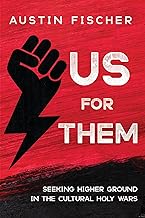Us for Them: Chapter 4: The Day of Small Things
Here I continue discussion of Austin Fischer’s excellent book Us for Them: Seeking Higher Ground in the Cultural Holy Wars (Cascade Books, 2024). I, we, come now to Chapter 4: The Day of Small Things: Learning to Think Little.
I can’t help but point out a bit of irony here. Austin, my former student and now (and forever) friend, pastors a mega-church. I’ve visited it. It’s big. It’s mega. In this chapter, however, Austin advocates thinking and acting locally. And enduring them of the chapter, foundational to it, is “think little, live local, love your neighbor.” (50) Fleshing this out, Austin quotes Robin Dunbar as famously positing that “150 people [is] the out limit of a human’s social network—beyond this ‘we simply do not have the computational capacity to manage social relationships effectively.” (48)
So what’s the irony of which I speak? Well, it should be obvious to anyone who read the chapter: It seems that Austin should be against mega-churches!
However, even he cannot stop hordes of people flocking to hear him eloquently and prophetically preach the gospel relevantly! How many preachers do you know who can quote both Spider-Man and Fyodor Dostoevsky in one brief chapter?
Here is the special passage I always look for when reading a chapter: “Before you storm the Capitol, teach your children to pray. Before you save the country, break bread with your neighbor. Before you make America just, make your community more just. Before you imagine yourself responsible for the world, responsibly submit to and serve your household of faith. Before you compose a grand opera, play your part well in the simple tune of the gospel.” (59)
What is the gist of this chapter? It is a call for especially Christians to stop focusing on global or even national political movements, events, problems and possibilities to the exclusion of staying faithfully in a community, striving to make it a true outpost of God’s coming kingdom.
In this chapter Austin continues his theme of people, including American Christians, hating other people because they are different or because they think differently. His message is: They are going nowhere. Within the church, commit yourself to them as partners for the gospel. Don’t seek a place far from home where you can gather only with like-minded people or people who share your values and perspectives.
I could go in several different directions responding to this chapter. I have already confessed, in an earlier response to a different chapter, that I have personally violated at least some of what Austin advocates. I have fled, possibly when I shouldn’t have. But I’m not sure about the “shouldn’t have.”
Here I am provoked to bring up again my experiences in some churches. When I was twenty-five years old I fled the denomination in which I grew up simply because I couldn’t take it anymore. Small-mindedness, anti-intellectualism, knee-jerk conservatism, rampant spiritual abuse, unethical leadership (some, not all), unjustified dogmatism, all and more caused me to run as soon as I viably could. That denomination was my “top soil” (a reference readers of the chapter will get), my place, my spiritual home, but it was unbearable. Years later I fled a church that had become so broad-minded it was shallow, empty of spirit, dry, knee-jerk liberal, exclusive except for people who thought like “good moderate Baptists,” that I could find no place in it. The beginning of the end for me and a couple others was when I suggested the church needed a good revival.
Well, I have to remind myself that I know what Austin is talking about in this book and it isn’t what I experienced or did. I think. I hope. He pastors a church where SOME people have trouble staying ONLY because they there encounter people who are different in some way, mostly different in terms of political commitments. And I discern that he is exasperated with (probably mostly young) people, university students (?), who are obsessed with big, global, national social and political problems to the exclusion of local ones.
I will plan to take up Chapter 5 in a week.
*Note: Only comment if you have read this chapter. If not, you may ask a question (or questions). In any case, keep you response relatively brief (no more than 100 words), on topic, addressed to me, civil and respectful (not hostile or argumentative), and devoid of pictures or links.*














